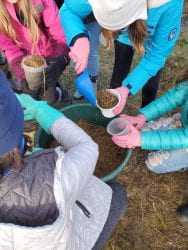
Conservation partners, middle and high school students, and community groups will work together to seed 25 acres of bay of Green Bay coastal wetlands with ~1,200 lbs. of wild rice in late October and early November.
This marks the sixth year of seeding as part of the restoration project, informed by UW-Green Bay aquatic vegetation research in the bay of Green Bay.
Participants will hand seed at 5 sites along the Green Bay west shore on the following dates:
Monday 10/24 and Wednesday 11/2- Students seeding at L.H. Barkhausen Waterfowl Preserve, Suamico
Friday 10/28- Oconto Sportsmen’s Club, Oconto
Monday 10/31- Sensiba Unit, Green Bay West Shore Wildlife Area, Suamico
Tuesday 11/1- Duck Creek & Lower Green Bay, Howard & Green Bay
Thursday 11/3- Red Arrow Park & Seagull Bar State Natural Area, Marinette
Wild rice, or Manoomin in Ojibwe, holds important traditional, economic, nutritional, and cultural value in the region for many of Wisconsin’s First Nations tribes. Wild rice seed benefits waterfowl as an important food source during fall migration and the plants contribute to fish nursery habitat and ecological diversity in coastal wetlands. Historical accounts suggest the wetland grass occurred widely along the shores and river mouths in the bay of Green Bay; however, wild rice has been uncommon to rare in coastal wetlands and tributaries in recent decades.
UW-Green Bay’s wild rice monitoring program helps conservation partners learn more about Manoomin stewardship and environmental conditions impacting aquatic vegetation. Wild rice re-establishment is one of a series of restoration projects in lower Green Bay and along the Green Bay west shore to enhance coastal wetland habitat for fish and wildlife, improve the health of the bay, and engage communities in conservation. The project is funded by Ducks Unlimited, US Fish and Wildlife Service’s Coastal Program, and Freshwater Collaborative of Wisconsin, among others.
For more information, contact Restoration Scientist & Green Bay Restoration Project Coordinator Amy Carrozzino-Lyon at (carrozza@uwgb.edu, 920-465-5029).

